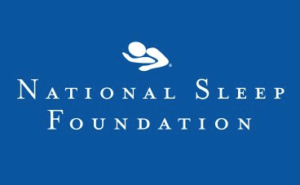To sleep or not to sleep....do we have the choice?
Since the Coronavirus lockdown started Charlotte McCawley from the Trust has experienced some disruption to her normal sleep patterns.
Here, Charlotte shares her experience and what she's learnt about getting a better night's sleep. Trust Medical Advisor, Susan Brennan, has also provided some supporting information.
You can also watch Charlotte's vlog and hear her talk about her experience.
 "As we near our 6th week of lockdown many of you will hopefully be settling into the new routine of life during the Covid-19 pandemic. Routine is key for me. I am fortunate to still be working my normal full time hours, albeit in different circumstances, but I still find my sleep is disrupted.
"As we near our 6th week of lockdown many of you will hopefully be settling into the new routine of life during the Covid-19 pandemic. Routine is key for me. I am fortunate to still be working my normal full time hours, albeit in different circumstances, but I still find my sleep is disrupted.
I’ve always been a light sleeper and often sleep with earplugs in but since our lives became somewhat turned upside-down I’ve found myself taking a long time to get to sleep and waking up several times in the night, sometimes for a couple of hours. Determined not to let myself be ruled by my sleeping patterns I’ve been on a quest to try everything I can to rectify this. Perhaps some of you may benefit too!
Setting the scene for a good night's sleep
Your Environment
A calm and tidy bedroom can make the world of difference to how you settle down in the evening. Make sure your room isn’t too warm, your bedding is comfortable and clean and that the lighting is low before you go to sleep. Clutter can play on your mind without you even knowing it so take some time to make your environment nice and cosy.
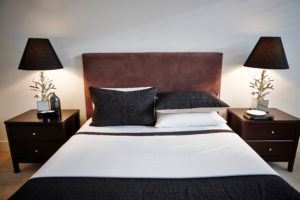
It’s so important to get a mattress that supports you. It may be worth thinking of using your Health Grant to buy a mattress if your current one is old. If you have a partner, you may have different sleeping positions and postures, so it might be worth thinking of an adjustable bed.
Switch off so that you can 'switch off'
Try to avoid your phone/TV screens at least 90 mins before bed, the blue light can increase alertness and mess with your natural body clock. Read a book, draw something or play some quiet music instead. I’ve taken up drawing recently and it is very calming – it doesn’t matter what you draw or read, the act of it is relaxing. Adding white noise has proven to be beneficial for some people too."
If you need to use a phone then you could get a screen that reduces the amount of blue light given off by your device.
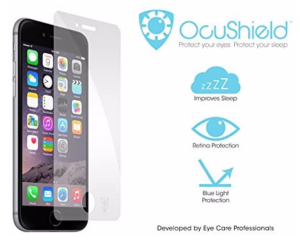
Avoid watching any horror films, thrillers, the news or anything that requires too much concentration, just before bed-time. Remember, you don’t want to stimulate your body and brain just before you go to bed.
Limit caffeine and alcohol
"This seems an obvious one but avoiding caffeine if you’re struggling to sleep is very beneficial. We’re not strangers to several cups of tea here at the office, we certainly get through the Yorkshire Teabags, but consider how this may be affecting you. Simply switching to a decaf option could make the world of difference to your brain's “off switch”. Some decaf can taste a bit weird so I recommend paying more for Yorkshire Tea’s decaf option, you can barely tell the difference. Alternatively a glass of milk before bed can really help you sleep.
And alcohol sadly won’t help you sleep either. It can raise your blood pressure and heart rate. I’ve compared my sleep on my fit watch on a normal night and on a night where I’ve had a few glasses of wine and not only is my heart rate much higher while I sleep, my sleep isn’t as consistent. We sleep in cycles and alcohol can disrupt this making you feel much less rested in the morning."

Many people try to use alcohol to send them off to sleep and while this does help you get to sleep, drinking before bed can cause your sleep to be disturbed through the night. If you’re having problems sleeping one of the best things you can do is to cut down on alcohol.
Other helpful factors.....
Eating a healthy, balanced diet is important not just for wellbeing but for our sleep too. There are some foods thought to beneficial for sleep as they contain a chemical called Tryptophan, a natural sleep-inducing hormone. Foods rich in Tryptophan include sour cherry juice, dairy products, eggs, wild salmon, bananas, seeds and walnuts. These may help aid a restful sleep.
Our bodies like routine – try and stick to a fixed bed time every night and get up at the same time every day (even if you haven’t slept well). Try to not compensate for a poor night’s sleep with lots of napping in the day.
If you can, get outside in the morning light or sit by a light window when you wake up. The natural light can help reset your body clock.
Managing things that can disrupt your sleep
Anxiety and worries
"These are anxious times for a lot of us, staying positive is one thing but slowing your brain down is something we could all benefit from time to time. With so much going on in our world it’s no wonder we aren’t as calm as we may usually feel.
If you feel like you can’t turn off the chatter that goes through your head, try getting a notebook or Dictaphone by your bed so you can get those thoughts out – no matter how trivial. Having a journal of your thought processes can help get them out of your head and also help you to understand your own mind and see what is bothering you. You don’t have to share it with anyone, it’s just a process that can be quite cathartic.
Avoiding the news can also really help, especially right now! Limit your reading/watching of the news to dedicated times of the day and try not to obsess over the bad stuff.
Talk, talk and talk!
It can be easy to get wrapped up in everything and start to think about the coming months of uncertainty. Instead, just take each day as it comes and you’ll find it much more manageable.
Talking to those you have around you is really helpful to get your thoughts and worries out in the open. It isn’t easy for everyone but take some comfort in the fact that we are going through this together. Make time in your day to call your family and friends, arrange video calls and speak to your neighbours (from a safe distance).
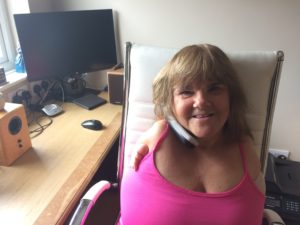
The team at The Trust have also been ringing round to all our beneficiaries to check in with you, but if you haven’t had a call yet don’t hesitate to call us instead. There’s always someone here for a chat and we have a fantastic Health and Wellbeing Team who can look after you if you think your sleep and/or anxieties are unmanageable.
Use Apps to help take care of our minds
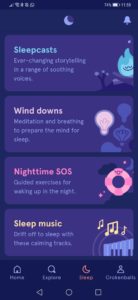 Headspace is a fantastic app that guides you through meditation. Not only for stress and anxiety but for sleep too. There’s easy tutorials to follow to help you start the process of meditation. It isn’t for everyone but it can certainly help to calm the brain and learn to let our thoughts pass through our minds instead of battling them. There’s also a dedicated sleep section where you can listen to music, sounds of the sea even a tropical jungle! There’s different price plans from £49.99 for a year upfront, £9.99 if paid monthly and it’s even free for NHS workers with an nhs.net account. You can do a free trial before you commit though if you prefer.
Headspace is a fantastic app that guides you through meditation. Not only for stress and anxiety but for sleep too. There’s easy tutorials to follow to help you start the process of meditation. It isn’t for everyone but it can certainly help to calm the brain and learn to let our thoughts pass through our minds instead of battling them. There’s also a dedicated sleep section where you can listen to music, sounds of the sea even a tropical jungle! There’s different price plans from £49.99 for a year upfront, £9.99 if paid monthly and it’s even free for NHS workers with an nhs.net account. You can do a free trial before you commit though if you prefer.
 Insight Timer is another app based on meditation but this one has the free version if you don’t want to pay for it. There’s lots of music/soundscapes on there designed to help you sleep, but make sure you’ve got comfortable headphones or play it out loud in your room.”
Insight Timer is another app based on meditation but this one has the free version if you don’t want to pay for it. There’s lots of music/soundscapes on there designed to help you sleep, but make sure you’ve got comfortable headphones or play it out loud in your room.”

Even if meditation isn’t for you, these apps do great ‘Sleep- casts’ which are audio recordings using soothing sounds, voices and stories to help us drift to sleep.
The NHS has produced some great resources for people with anxiety surrounding the Corona virus.
Medical issues
We know many of you live with pain on a daily basis and managing your pain is key to helping your sleep. If pain is disturbing your sleep, please talk to your GP or ask to speak to one of the Trust’s Medical Adviser on how best to improve and manage your pain.
Do you snore? Don’t feel refreshed after a seemingly good night’s sleep? Perhaps someone has noticed you have a pause in your breathing when you sleep. It may be that you suffer from Sleep Apnoea, a condition where the walls of throat soften and narrow when you sleep, interrupting normal breathing. If you think you may be affected, please talk to your GP or one of the Medical Advisers at the Trust.
Medication, treatments and equipment that can help
Weighted blanket
"Simba have developed a weighted blanket especially for people who are struggling to sleep at night. With the principles of Deep Pressure Therapy, the blanket is designed to calm and ground you, almost like having a full body hug! It’s a beautiful soft cotton grey blanket filled with thousands of glass beads. You’ll be surprised at just how heavy it is when it comes (they come in two weights, 6.8kg and 9kg) but it doesn’t feel too much once the weight is distributed. I kindly got sent one by my Dad a few days ago and so far so good!

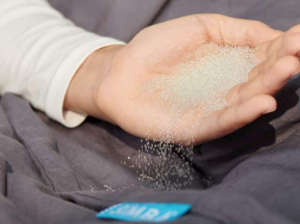
Herbal medication and oils
There are a range of herbal sleeping medications and oils which you may find useful but always read the instructions carefully and consult your doctor about taking them. And if you’re still having real issues with sleep then you should consult your GP to see if it would be worth considering medication."
Treatments
This is a hormone produced by the body when it’s dark that helps to promote sleep. As we get older, the levels of Melatonin naturally reduce and so can contribute to worse sleep. Melatonin can now be given on the NHS in people over 55 to help boost levels and help aid sleep. The dose is usually 2mg taken an hour or two before bed. It can make you sleepy the next day so do be careful if you have to drive the next day and do not drive until the effects have worn off. Melatonin is usually prescribed for a period of up to 3 months. Speak to your GP if you want to find out more.
If you’re really struggling, then it may be worth considering Cognitive Behavioural Therapy. Your GP can refer if you have persistent poor sleep and the above methods haven’t helped. CBT can help us challenge the negative thoughts and anxiety we have that prevent us from sleeping well. You can also try CBT online with “Sleepio”.
